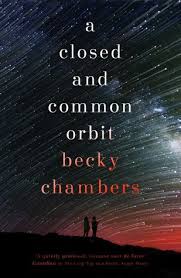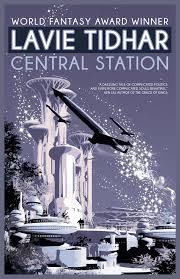Clarke Award Shortlist 2017 Part 1 : Faith in the Future
This year I'm breaking the review up into three parts, because the shortlist, in my idiosyncratic perspective, seems to form some loose pairs, so first I give you:
A Closed and Common Orbit – Becky Chambers
Central Station – Lavie Tidhar
 Because I didn’t get the chance to do a Clarkeslist post last year, for what I hope are excusable reasons, I was denied the opportunity to laud Chambers’ first outing, A Long Way to a Small and Angry Planet. This book was one of the ones I would have been happiest to lose to. It was also the subject of a mixed bag of reviews, which may be because it’s SF about, not the space beyond our atmosphere but the space between people (which ‘people’ very emphatically includes nonhuman sentience). In a weird kind of way, Planet was a Sci-fi soap opera, in the same way that Jay and Miles Explain the X‑Men describe their focus as a superhero soap opera, which only goes to confirm that my aversion to soap operas as commonly seen on the TV is because the people depicted live such dull and humdrum lives. Add spaceships and an AI or two and I’d be hooked (1). Planet, then, is about the journeys of the characters, separately and together, as much as the titular journey itself. It presents a universe that is by no means idealised, but is remarkably upbeat and hopeful compared to the majority of SF – that rare thing, a believable future you’d want to live in. Highly recommended, anyway.
Because I didn’t get the chance to do a Clarkeslist post last year, for what I hope are excusable reasons, I was denied the opportunity to laud Chambers’ first outing, A Long Way to a Small and Angry Planet. This book was one of the ones I would have been happiest to lose to. It was also the subject of a mixed bag of reviews, which may be because it’s SF about, not the space beyond our atmosphere but the space between people (which ‘people’ very emphatically includes nonhuman sentience). In a weird kind of way, Planet was a Sci-fi soap opera, in the same way that Jay and Miles Explain the X‑Men describe their focus as a superhero soap opera, which only goes to confirm that my aversion to soap operas as commonly seen on the TV is because the people depicted live such dull and humdrum lives. Add spaceships and an AI or two and I’d be hooked (1). Planet, then, is about the journeys of the characters, separately and together, as much as the titular journey itself. It presents a universe that is by no means idealised, but is remarkably upbeat and hopeful compared to the majority of SF – that rare thing, a believable future you’d want to live in. Highly recommended, anyway.
A Closed and Common Orbit (which is also on the Hugo shortlist right now) is a semi-sequel, readable in isolation but better after having taken in the first. Rather than scatter the plot over a large number of characters like Planet, Orbit follows two plotlines separated in time, both of which revolve around the relationship between living people and AIs. In this universe, AIs are entirely sentient but are property, and to incarnate one in a human-seeming body is possible but very very illegal – a standout dystopian note in an otherwise enlightened galactic community. Lovelace is such an incarnated AI trying to adjust to her new limits and abilities under the tutelage of Pepper, whose backstory we also slowly uncover, with its own peculiar relationship to AIs. I enjoyed Planet immensely, but I think Orbit is the superior, both for its tighter focus and for its exquisite exploration of the shift from being a ship-wide AI to suddenly being limited to a human body – although the previous book sold the transition as a good thing, Lovelace finds the situation profoundly discomforting at every turn. It is also a very emotive book, the dénouement bringing a definite tear to the eye. I want to wave a flag for Chambers’ aliens – while there is a definite Trek-like philanthropic principle going on, the species are all well defined, and then the individuals are separately defined so that you don’t get the common problem of “all of X species are like this”, and furthermore “X species are basically humans with this hang up and a narrowed emotional range”. Like Planet, Orbit makes a virtue of telling the stories of ordinary people in a multispecies galactic community, with plenty of digressions and diversions that only add to the verisimilitude of the world and the characters.

Lavie Tidhar is already a decorated author with a World Fantasy Award under his belt, among others. I first came across him with his steampunk fantasy Bookman series, which has a pleasant quota of insect-like things and a glorious collusion between Dr Moreau and Dr Pavlov. More recently he has become known for writing weirder stuff – Osama, A Man Lies Dreaming and the Superhero/espionage This Violent Century which was my personal favourite. Central Station is a fascinating glimpse of a sort of “future that never was” in the same way Gibson’s Neuromancer and sequels is. The book is set primarily in Tel Aviv, gateway to the stars and major jumping off point for a solar-system wide community. Like Chambers’ work, the book is driven by the characters and their inter-relations rather than rushing along a plot, so that Tidhar presents us with a slice of life of the lowly, broken and strange who live in the shadow of Central Station. The feel is part pulp SF serial, part cyberpunk, part Perdido Street Station (2). Tidhar (also like Mieville) is extremely good at conjuring a huge and detailed world beyond the book with just a few chance mentions and throw-away references, so that the future Israel (seen primarily through the eyes of the descendants of Nigerian and Chinese immigrants) and its wider environs are brought alive for the reader at every turn. And there are godlike AIs (the story of whose genesis is a major thread) and abandoned war cyborgs and a glorious homage to CL Moore.
Even more than the two Chambers books, Station isn’t a book about space war or the end of the world, save as that latter applies to individuals. It is a tapestry of individual characters, every one artfully and lovingly drawn down to the very least, whose lives touch and interact with each other, but who exist in their own right rather than to serve the thrust of a greater plot. At the end, some may find a measure of peace, some may find a modicum of the knowledge they seek, something new might be born, something else may finally find an end. But that’s not necessarily what the book’s about. It’s about the people (including robots, cyborgs, sentient infowar weapons, and also just people) whose lives we pass briefly through, just as they pass briefly through each others’
I had read A Closed and Common Orbit before the shortlist, and coming to Central Station after I was struck by how complimentary the two books are, and how similar their concerns. As well as the very street-level focus and the willingness to simply let their characters live, both books depict a future that is, despite all the trials and tribulations of the people involved, fundamentally optimistic (3), which is something of a rarity these days. Neither is about the super-powerful or the super-rich swanning about bleeding luxury, and neither is about a post-scarcity Banksian world where everyone can have everything (though the Chambers is closer), However, even taking into account the failing Robotnik cyborgs and the existential crisis of the robot clergyman R.Brother Patch-It, or Lovelace’s illegal status and the exploitative past of Pepper, both books envisage a future where we have at least Got There. We’re out in space, making and/or meeting wonderful things. Right now, looking at the world, we should be so lucky as to have a future like that.
(1) And arguably genre TV since Buffy has been all about using soap operatic elements in a supernatural or SF setting, and has benefited immensely from it.
(2)And it’s not just the name. Mieville and Tidhar are both intimately concerned with the littoral, the places where one thing meets and transforms into another, whether that boundary is within a city or within an individual.
(3) YMMV, I thought so, anyway.
 © 2008-2025 Pan Macmillan
© 2008-2025 Pan Macmillan
[…] “Clarke Award Shortlist 2017 Part 1 : Faith in the Future” by Adrian Tchaikovsky. […]